September 30, 2009 – 8:00 pm

Construction company, Unity Infra projects said that it has received a contract worth Rs 54.56 crore from Amanora Park Town for construction-related works. The scope of work includes construction of six towers among others, Unity Infra projects said in a filing to the Bombay Stock Exchange. The project is scheduled to be completed in 29 months. Shares of the company closed at Rs 408.55, up 0.91% on the Bombay Stock Exchange.
September 29, 2009 – 5:38 pm

Parsvnath Developers has said its ‘overdue payments’ stood at Rs 63 crore and Rs 143 crore as on July 1 and August 31, respectively, under loan agreements and other outstanding indebtedness. The company said this in its Preliminary Placement Document filing on the NSE.
The company’s Chairman, Mr Pradeep Jain, was not available for comments, despite repeated attempts.
Meanwhile listing out the risk factors, the document by Parsvnath said, “We had overdue payments of Rs 631.13 million and Rs 1,433.57 million, as of July 1, 2009, and August 31, 2009, respectively, under our loan agreements and other outstanding indebtedness with an aggregate outstanding balance of Rs 16,370.77 million and Rs 17,849.51 million as of June 30, 2009, and August 31, 2009, respectively.”
The amount of overdue indebtedness has not increased since September 1, it said.
Parsvnath said it has not yet received any notice of default from financial institutions and banks.
“Some of the unpaid amounts have been overdue for more than 60 days, and continued delays in payment will trigger additional cross-defaults under other agreements,” it said.
The company pointed out that its promoters have disclosed that as on September 21, 62.4% of the total outstanding shareholding of the company has been pledged by them to banks, financial institutions and other lenders. “Given that substantial portion of the shareholding of the promoters has been pledged to banks and financial institutions, as a result of any default under the financing documents, the banks and financial institutions may sell the equity shares pledged to them in the open market, thereby, diluting the shareholding of the promoters,” it said.
Speaking to Business Line last week, Mr Jain had said the company would raise between two hundred fifty crore to five hundred crore rupees through QIPs issue, and that 60% of the QIP proceeds will go towards reducing the company’s debt.
September 28, 2009 – 3:25 pm

Vatika Group announced that it will open the Westin Hotel in Gurgaon by March next year, seven months before the commencement of the Commonwealth Games in October next year. The opening of the Westin Hotel will help to meet the hotel room needs for the mega event next year as the city is already facing an acute shortage of over ten thousand rooms.
The new Westin Hotel is strategically located at the emerging central business district of Gurgaon and will provide travelers easy access to key convention and commercial offices which have started to shift towards Gurgaon area due to lack of sufficient land for development of sizeable projects in New Delhi. The hotel will feature 311 rooms, five dining outlets, 17500 square feet of meeting and function space, an approximately 16000 square feet health and spa center, as well as retail outlets.
Mr. Gaurav Bhalla, Deputy MD–Vatika Hospitality, said “We have kept our commitment of completing the Westin Hotel in Gurgaon before the commencement of the Commonwealth Games by announcing its opening in next year March. Vatika has been diligent and focused to achieve and respond to the city’s increased need for lodging due to the upcoming Commonwealth Games in the City.”
The decision to venture into the hospitality business was merely an extension of group’s aim to transform all aspects of human Endeavour. Therefore we launched various brands of specialty restaurants namely the Fox, Coriander Leaf, 56 and Jing apart from the Westin tie up.
The Vatika Group has a portfolio of projects that span office spaces, retail, residential, hotels, resorts, specialty restaurants, and business centers. The group has three major township projects spread over total of approximately 1800 acres namely Vatika Infotech City in Jaipur, Vatika India Next in Gurgaon and Vatika City Central in Ambala.
The Group has also completed 90% of its first residential project called Vatika City in Gurgaon and houses 500 families. The group’s commercial projects are spread across Gurgaon and Jaipur. Gurgaon has 5 operational projects with clients like SAP, Starwood, HDFC, Xerox, Etisalat, Lenovo, Glaxo Smithkline, MSD pharma etc.
September 28, 2009 – 2:03 pm

The upward movement has begun. Not only have the sales picked up, but the prices of residential property too have increased 5-15 % in the last couple of months. With a long festive season ahead, realty experts believe property markets could see heightened activity, provided developers desist from increasing prices of residential space any further.
Aditi Vijayakar, the executive director (Residential Services, India) of Cushman and Wakefield, said, “The festive season (September-December) has historically been a buying period, with a large chunk of overall sales being converted during this auspicious time. Some developers see as much as 30-40 % of the yearly sales taking place during the festive season”. Further she pointed out, “Residential prices have increased by 5-15 % from the bottom it made in the first half of the year. If the developers continue to raise the prices then the renewed demand and interest that is being witnessed will start to abate”.
She added, “The previous year has been a taxing one for the real estate industry and the initial signs of recovery are evident in the market, and as most of the sales happen during the festive periods, developers have to be cautious not to hike prices in projects and new launches as this will drive out the end users and prolong the revival in the residential space”.
According to the expert, almost all cities are registering a rise in sale as transactions had frozen up during the start of the year. But now as the economy has stabilized and is back on the growth trajectory, there is a revived interest in buying homes by end users and this increase in confidence, better economy, favorable borrowing conditions and rationalized capital values amongst others which is promoting rising sales across India.
September 26, 2009 – 4:43 pm
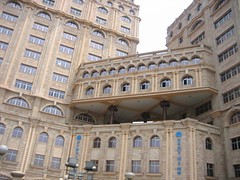
The Maharashtra Chamber of Housing Industry (MCHI) will organize an exhibition `Property 2009′ at MMRDA Grounds, Bandra Kurla Complex, from October 1st to 4th. Over 75 real estate developers will showcase their projects in Mumbai and suburban areas such as Thane and Navi Mumbai, besides Pune. State Bank of India is the co-organizer of the event. The other partners in the four-day programme include ICICI Home Finance, Axis Bank, LIC Housing Finance, IDBI Bank, and HDFC. Citibank NA, Dewan Housing Finance Corporation, GIC Housing Finance, IDBI Home Finance and Kotak Mahindra Bank will also participate.
September 26, 2009 – 12:00 pm

Knight Frank has introduced a real estate guidebook for India. The book provides information needed to invest in real estate market. Mr Pranay Vakil, Chairman-Knight Frank India, said, “We felt the need for a single credible source of information for which we brought together the best minds of the industry in business. This book makes real estate market simpler by offering tips”.
September 25, 2009 – 1:01 pm
Knight Frank India said that prices in the residential property segment are likely to decline in a short time. Knight Frank India Chairman Pranay Vakil said, “We feel prices of residential segment may go down over a period of time”. Further he added that the residential segment may see a robust demand in certain markets and it was also a good time for property developers to invest in land.
Real estate demand at this stage is the result of investor-led demand and end-user demand. While investor demand is due to shift in money from equity markets, on the other hand the end-user demand is due to increased consumer confidence and pent-up unmet demand from the recession period. This leads to a rapid increase in demand for real estate and also in property price.
September 25, 2009 – 1:00 pm
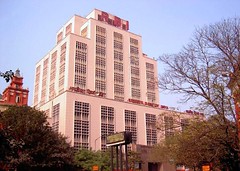
The Reserve Bank of India instructed banks to meticulously assess the inherent group risk on borrowal accounts coming under the real estate category.
This caution comes in the wake of the RBI’s findings that some of the companies operating in the sector have significant exposure in the form of advances, investments etc., to their subsidiaries and other group or related entities.
Further, while assessing the loan requirements of large builders/land developers, banks should carefully analyze the financial credentials/viability of the borrowers on a consolidated basis supported by the consolidated accounts/position of the group, the central bank said in a notification.
Banks should also examine the financial credentials/viability of the relevant unconsolidated related entities such as SPVs. The current practice in the real estate sector is that builders/developers hive off each project as a special purpose vehicle so that projects are ring-fenced from each other.
According to Mr B.K. Batra, Executive Director, IDBI Bank, when considering loan proposals from the real estate sector, banks would do well to gather comprehensive information about a builder and the associate companies and SPVs floated by him so that right credit decision can be taken and exposure ceilings to individual or group borrowers are not breached. Banks are required to frame comprehensive prudential norms relating to the ceiling on the total amount of real estate loans, single or group exposure limits for such loans, margins, security, repayment schedule and availability of supplementary finance and the policy should be approved by the boards.
September 24, 2009 – 11:53 am
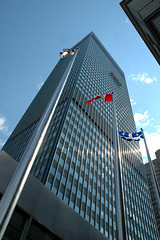
Lodha Developers Ltd. has been selected as one of the India’s top ten builders on the basis of a survey conducted by Construction World, India’s premier magazine for the construction sector.
The survey was conducted over a period of 4 months among a spectrum of handpicked audience comprising industry professionals from across India.
Mr. Abhisheck Lodha, Director, Lodha Developers Ltd. said, “Our selection as one of the top ten builders in India by the Construction World is recognition to our standards of excellence in every aspect of our services and our presence in varied segments like high-rises to mid-income luxury, in the real estate sector”.
Instituted by ASAPP Media, the award is recognition of exceptional work done by architects and builders in various aspects of infrastructure and real estate industry over the years.
September 24, 2009 – 11:14 am
Century Real Estate is the latest to join the affordable housing bandwagon. It has come up with ‘Century Indus’ project that offers apartments in the Rs 20-30 lakh category.
Mr P. Ravindra Pai, MD, Century Group said, Acquiring land at historical rates has helped the company make the project affordable.
The company has a land bank of over 3,000 acres, most of them acquired in historical rates, worth about 2 billion dollar. There are plans to make use of some of the land parcels to develop few more affordable projects in the city.
“We propose to develop 6,500 apartments targeted at the affordable segment, approximately seven million sq ft development, with a budgeted outlay of Rs 1,050 crore in the next three years,” said Dr P. Dayanand Pai, Founder and Chairman, Century Group. The projects would be located in North and West Bangalore.
Mr Pai said that the group has now formed ‘Century Real Estate Holdings.’ About 300 acres, valued at Rs 1,200 crore, from the land-bank have been transferred to this company, and about 12 projects would be developed on this land.
The company is looking at raising funds at entity and project levels. At the entity level, it plans to raise Rs 200 crore as bank debt for pre-development of these 12 projects. “We have almost tied up the debt,” said Mr Pai.
September 23, 2009 – 4:15 pm
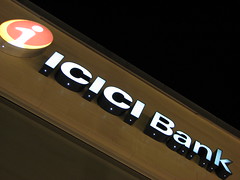
In yet another big ticket realty deal in Chennai, India Cements has acquired the ICICI Bank owned large commercial space in the upmarket Santhome High Road in the city reflecting the uptick in the property market. Sources close to the transaction said that ICL has struck the deal for Rs 63 crore.
ICICI Bank had put up for sale 9-ground (21,665 square feet) prime property with a built up space of 83, 772 square feet on the busy Santhome High Road. Recently, the bank moved the operations in the building to Ambattur in North Chennai.
September 22, 2009 – 4:59 pm

People who borrow money from banks to buy homes at floating rates of interest are set to benefit as banks are expected to change the way they price such loans.
The Reserve Bank of India is preparing to ban lending below the prime lending rate, the benchmark rate for all floating rate bank loans.
Sub-PLR lending came into existence a decade ago after banks obtained permission from the central bank to lend below the benchmark rate.
September 22, 2009 – 3:59 pm
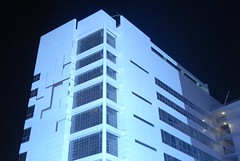
Rentals of retail spaces in NCR and Mumbai have decreased by up to 15% in the first half of this year over the past six months on account of low demand and high base effect of last year.
According to global real estate consultant CBRE, rentals in the NCR have corrected by about 10% in the first six months over the second half of last year.
It said that the decline was similar to an overall drop of 20% to 40% from the levels witnessed in the beginning of last year.
According to CBRE report, Prime high-streets and mall spaces continue to be the focus for expansion for retailers as the rentals in these spaces have corrected due to the reduced demand and high rental values.
The consultant further said that in Mumbai, rentals are showing correction by 10% to 15% amid limited supply of “quality” space on some prime high-streets through the first half of current year.
September 22, 2009 – 3:58 pm
The increased supply of ‘affordable’ housing and the demand for it has improved volumes for developers, but this has also meant that the rise in values has been significantly less.
Balakrishna Hegde, former president of CREDAI, Bangalore, points out that while volume demand is up by 50% to 60%, the rise in value has only been about 25%.
Affordable housing does not yield the 50%- 100% margins that developers were used to before the economy slowed down. And even in higher priced projects, developers have been forced to cut their margins to draw in buyers.
There are isolated instances of developers, riding the marginal recovery in the economy, reverting to high-margin premium housing, but the big immediate hope is still affordable housing, flats up to about Rs 25 lakh.
September 21, 2009 – 11:58 am
Raising home prices may anticipating festive season demand.
Mr. Niranjan Hiranandani, MD of Hiranandani Group, said “It is not very wise to increase prices drastically now”. Further he said, “The market has just recovered and buyers are returning back”.
The shortening of supply due to a 45% decline in new projects in tier-I cities has also enhanced the prospects of higher prices.
Mr. Abhisheck Lodha, director of Lodha Developers, said, “We have sold around 2.5 million square feet in the last quarter and are expecting to sell over 1.5 million square feet during the last quarter of this year”. Further he added, “Normally, the festive season is when there are a lot of bookings in the real estate sector”.
September 19, 2009 – 12:05 pm

In a move that could have implications for the process of land acquisition for industry, the Dharwad district administration has introduced a system to prevent delay in processing applications linked to land conversion.
The Deputy Commissioner, Mr Darpan Jain said that though according to Section 95 of the Karnataka Land Revenue Act, 1964, permission for conversion of land use had to be granted within 45 days, the current method was causing unnecessary delay and there was no means for the applicant to know the status of his application.
Mr. jain further said, “We have decided to re-engineer the process of land use conversion so that the process is simple and on the spot”.
Under the new system, applications for land conversion from applicants in Hubli and Dharwad would be collected at a counter established on the premises of the Deputy Commissioner’s office. In the remaining three taluks of the district, applications would be accepted at the counters established in the offices of tahsildars, he added.
He said that a single counter for Hubli and Dharwad would save the time lost in forwarding applications from the tahsildar’s office to the Deputy Commissioner’s office.
Under the system, details of applications would be entered into a computer system and application would be verified taking into account the enclosed documents, the number of which had already been reduced.
September 18, 2009 – 11:51 am
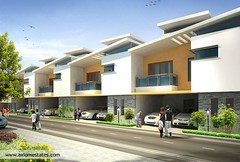
To bring in more transparency to its accounting procedure, Bangalore-based real estate developer Lalith Gangadhar Constructions will maintain an exclusive construction escrow account with Kotak Bank for the LGCL-Ashlar project it is developing in Garden City.
The Rs 150-crore project comprises 63 villas on 7.75 acres, each carrying a minimum price tag of Rs 2 crore.
The developer plans to launch two more luxury format projects. The company will keep the budgeted construction cost for the project in a separate construction escrow account from payments received from the home-buyers. The funds here will be used solely for project construction.
September 17, 2009 – 12:40 pm

Bajaj Auto vice chairman Madhur Bajaj, who in his personal capacity owns over 350 acres of land under Emerald Acres, plans to liquidate a large portion of his land-holdings to unlock value as the real estate sector looks up after the downturn.
He said that he has no plans to venture into real estate development in next ten years and would prefer sell outright large parcels of land to developers or sell through plotted schemes.
Further he added “We don’t have any expertise in construction and so we don’t want to get into development at this stage. We are in the process of valuing the land price and would put it for sell soon.”
He further stated that Emerald Acres has nothing to do with the Bajaj group, as he had purchased land in the past four years through his personal money.
Emerald Acres owns land in the stretch between Mumbai and Pune highway and the largest piece of 124 acres is located at Lonavala, a hill station near Mumbai. The rest are in eight other locations including Murbad near Thane and Khandala, another hill station.
Mr. Bajaj further said, “A township can come up at the Lonavala land and all other plots are uniquely located. We are planning to sell these so that we can buy more land maximise the value.
September 17, 2009 – 11:41 am

The tax on income from house property has all along been on one’s potential income and not on one’s actual income unless the latter happens to be greater than the former. The Direct Taxes Code strays away from its basic objective by factoring the cost of construction or purchase where rateable value has not been fixed by the municipal authorities.
Briefly, what is proposed by the DTC is income from house property would be deemed to be the actual rent receivable or the presumptive rent, whichever is greater. And the presumptive rent is deemed to be 6% of the rateable value fixed by municipal authorities or if it is not so fixed, then 6% of the cost of acquiring the house.
Under the extant regime, market rent is a significant factor in determining the potential rent. The Government perhaps feels that figuring the market rent is difficult given the various subterfuges adopted, such as camouflaging a part of the rent as interest-free or concessional deposits, etc.
Therefore, it seems to have plumped for the rateable value which to be sure is also premised on the market rent without being property-specific. But then the danger of this approach is the municipal authorities do not bestir to revise the rateable value every year. In the event, what is considered for income-tax purposes may be outdated and inappropriate even though it may be appropriate for levying municipal tax.
September 16, 2009 – 12:31 pm
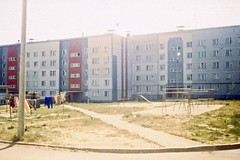
City Corporation has started apartment exchange scheme. This exchange scheme meant for its future customers who would exchange their present house with an apartment in the firm’s Amanora Park Town project in Pune. City Corporation would buy old apartments from customers, renovate them and sell-off through an established network of real estate agents.
City Corporation is developing a 400-acre township named Amanora Park Town in Pune, which would have 12,000 apartments in different categories. As per this scheme, a flat owner, who wishes to buy an apartment at Amanora Park Town, would hand-over power of attorney to City Corporation at a mutually agreed price. This amount would then be considered as down payment for the new apartment booked in Amanora Park Town and the flat owner would continue to stay in the old flat till the new flat gets ready.
September 16, 2009 – 10:55 am

The revival of riches in the real estate sector has encouraged textile companies with huge land banks to enter into property development.
Among such companies are textiles major Bombay Dyeing and Century Textiles.
Golden Tobacco, manufacturer of the Panama and Chancellor cigarette brands, is also considering to have its real estate arm to utilize its land assets across the country.
Earlier, groups like Tata, Mahindra and Godrej also entered the realty space. The Tata group has Tata Housing and Tata Realty while Mahindra’s venture is called Mahindra Lifespace Developers. Godrej’s venture goes by the name of Godrej Properties.
September 15, 2009 – 4:54 pm

Photo by truedudiMafatlal Industries has put an eighty five thousand sq ft property in central Mumbai on the block hoping to generate between Rs 100 cr and Rs 150 cr. The proceeds will be used to revive the operations of the loss-making company.
A senior company official confirmed the decision to sell the property and said the bidding process could start within a couple of days.
Located at Lower Parel, the building called Mafatlal Chambers B, is one of the many properties in the city owned by the group.
Cushman & Wakefield (C&W), the international property consultant, is advising Mafatlal Industries on the deal. Industry trackers said the prevailing rate for commercial property in central Mumbai is in the range of Rs 15,000-20,000 per square feet. The minimum bid price for this property has been set at Rs 11,000 per square feet.
September 14, 2009 – 1:55 pm
The increase in the floor space index could just be the shot in the arm for Mumbai’s redevelopment story. A recent amendment to Section 33(7) of the Development Control Regulations, 1991, has raised FSI, the ratio between the allowed built-up area and plot area available, for redevelopment of cessed buildings from 2.5 to 3. An FSI of 1, for instance, on a plot of hundred square meters implies that one can have a built-up area of hundred square meters.
This comes at a time when redevelopment could revive the sector. Quality land has come at a premium in the commercial capital of India that has resulted in prices often getting to unaffordable levels.
September 12, 2009 – 3:45 pm

With a recovery in the residential portion of the real estate sector gaining ground, developers in Mumbai are banking heavily on the premium category. While relatively older apartments in South and central Mumbai continue to command a premium, new properties in these locations have not been left behind.
Developers said that the big-ticket deals in the sector are in the range of Rs 5 crore to about Rs 35 crore. The price starts from twenty-five thousand to one lakh rupees per square feet. Among the properties that are bringing in high levels of interest are Mantri Ruby in Walkeshwar, Orbit Arya in Nepean Sea Road and Mittal Grandeur in Cuffe Parade. Adjoining areas like Worli Seaface and Mahalaxmi are also viewing concern from buyers.
A deal for the sale of a new apartment in Cuffe Parade was hit at Rs 33 crore, with the transaction expected to be completed in about a month. One more property in Cuffe Parade, Mittal Grandeur, has an asking price of fifty crore rupees per apartment. This is for eight thousand square feet property having six bedrooms.
September 11, 2009 – 1:20 pm

The Greater Mohali Area Development Authority will implement a land pooling scheme for three major projects.
Farmers whose land will be acquired for the road linking S.A.S. Nagar international airport with Zirakpur and Patiala, Kharar-Desumajra airport road stretch and Mullanpur Urban Estate will be able to avail benefits like owning a plot. Under the scheme, a farmer will be made owner of 50% of land after GMADA develops it into a residential, commercial or an institutional plot. For 1 acre of land, a farmer will be given a residential plot of 980 square yard and commercial plot of 121 square yard in the developed area. The GMADA will also pay rent to farmers till they are allotted plots. The collector will fix the rent.
GMADA wants to popularise the land pooling scheme and have launched an awareness programme. However, it won’t be binding on the farmers to toe the GMADA line. In case any farmer does not want to opt for the scheme, GMADA will pay him cash fixed by the Land Price Fixation Committee.
The GMADA had decided to acquire 771 acres of land to build 200-metre wide road from the international airport to a site near Chhat village on the National Highway 64. On both sides of the road, some area will be allowed for mixed land use, implying that people can run commercial activities.
The GMADA will acquire 260 acres for KhararDesumajra-airport road stretch and 444 acres for Mullanpur Urban Estate.
Notifications for two projects have been issued while that for Urban Estate will be done soon.

 Latest Properties
Latest Properties


















